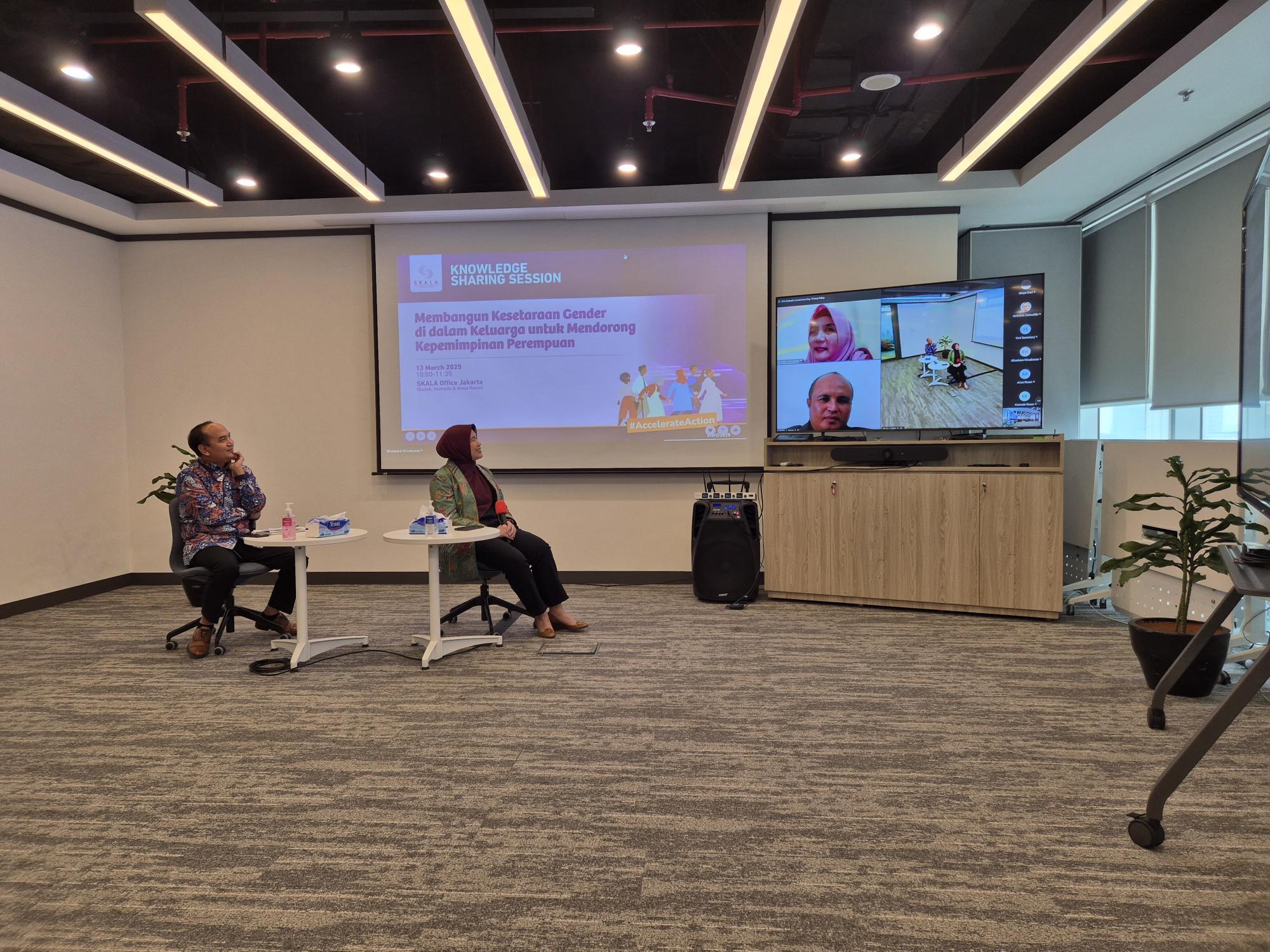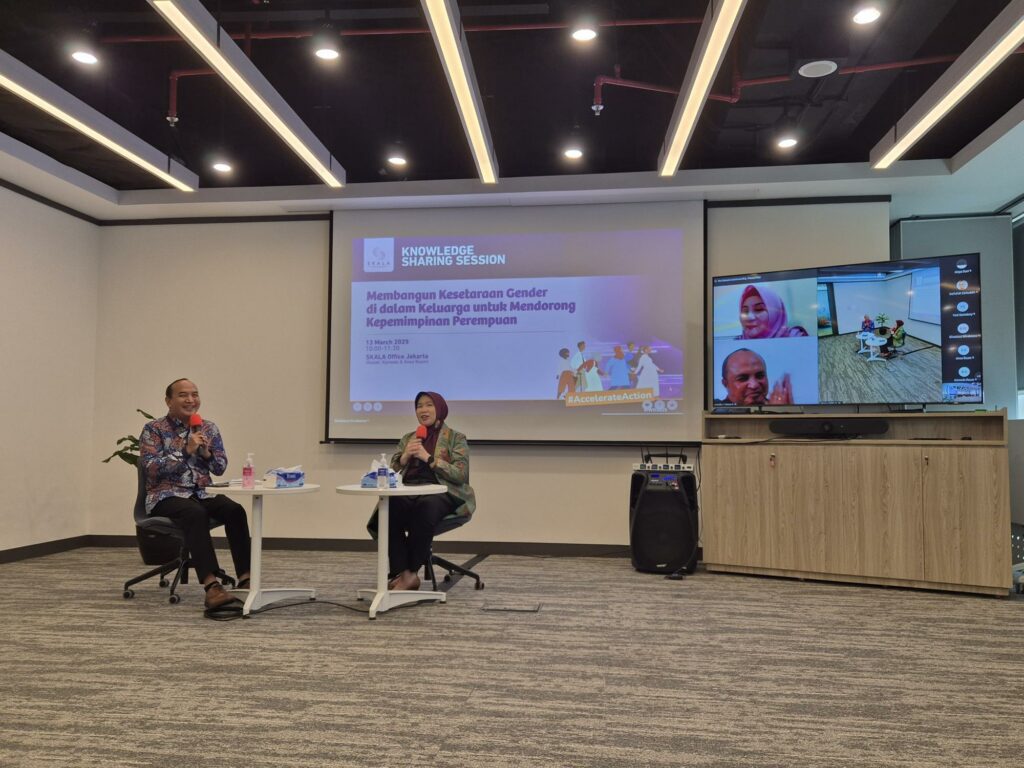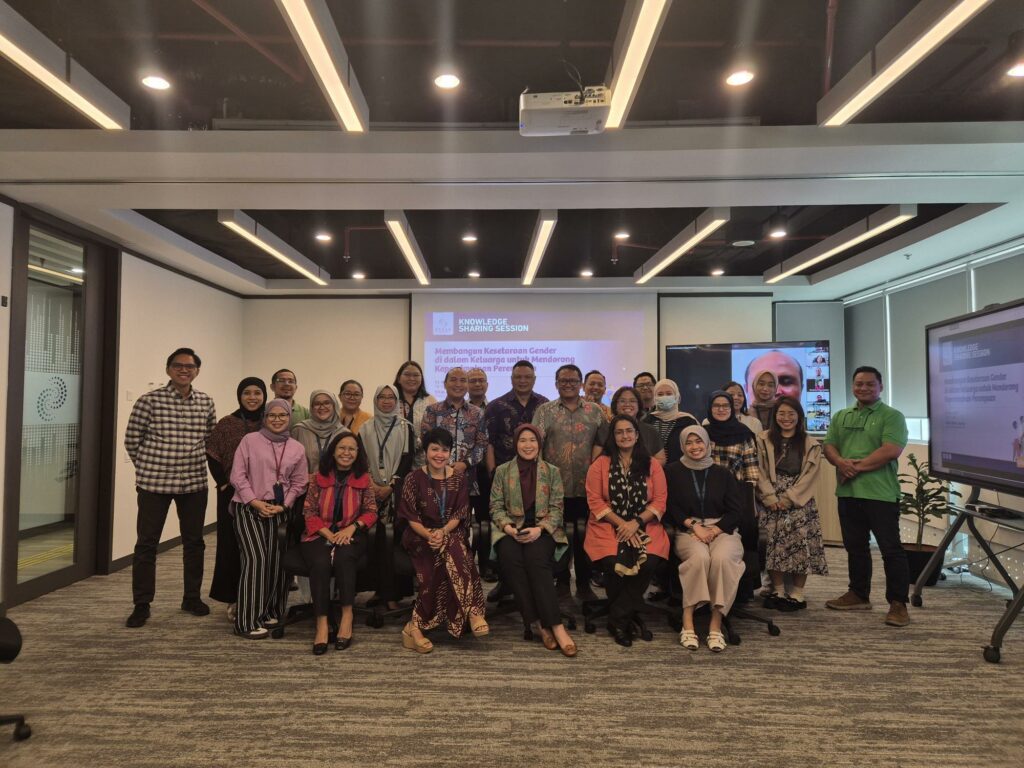International Women’s Day: Nurturing Women’s Leadership Begins at Home

“Gender equality starts at home.”
This message echoed during SKALA’s Knowledge Sharing event on 13 March 2025, which was held to celebrate International Women’s Day. The session, titled “Building Gender Equality in the Family to Promote Women’s Leadership”, brought together representatives from the Australian Embassy, DT Global, SKALA staff, and government partners from 7 SKALA-supported provinces.
Moderated by SKALA’s Policy Advocacy Lead, Iskhak Fatonie, the discussion featured three speakers: Dini Maghfirra, Executive Director of Satu Data Indonesia at Bappenas; Dr. Yana Yanti Sulaeman, Head of the Gorontalo Provincial Office for Women’s Empowerment and Child Protection; and Alexander J. Hayer (or Bapak Lexy), Junior Expert Planner at the South-Central Timor District Development Planning Agency (Bappeda). They shared insights and experiences on how to build gender equality, starting within the family.
The discussion is highly relevant to the Indonesian Government’s efforts to realise the Golden Indonesia 20245 Vision (Indonesia Emas). This commitment is reflected in the 2025-2045 National Long-Term Development Plan (RPJPN), particularly in Goal 14: Quality Families, Gender Equality and an Inclusive Society.
To support this long-term vision, the 2025-2029 National Medium-Term Development Plan (RPJMN) includes a key development target to strengthen women’s independence, leadership and representation in decision-making. This goal is supported by enabling policies, better access to resources, and sociocultural norms that encourage meaningful participation by women in development.
Progress is measured by indicators such as the percentage of women in first- and middle-level government leadership roles, in managerial positions, and as village heads.
Navigating Barriers to Women’s Leadership
All speakers began by addressing the cultural, social, and structural barriers that continue to impede women’s leadership pathways. Yana drew attention to cultural practices that harm women’s rights, such as mongubingo or female circumcision which persists in some communities in Gorontalo.
“Such practices not only endanger women’s health, but also reinforce deep-rooted discrimination,” she said.
Lexy added that traditional gender norms and patriarchal attitudes remain a major obstacle.
“Women’s contributions are often undervalued. These norms limit their ability to be seen and accepted as leaders,” he said.
Dini highlighted the multiple roles that women are expected to manage, beyond what is often described as a ‘double burden’.
“It’s not just a double role; it’s a fourfold one, women as professionals, wives, mothers, and daughters,” she said.
Without sufficient support, many women are forced to put career advancement and personal development on hold.
The Family as a Foundation for Gender Equality
Despite these challenges, all three speakers agreed that family is the first and most vital support system in a woman’s leadership journey. Dini credited the encouragement she received from her husband and workplace as instrumental, particularly when she pursued postgraduate study abroad.
“When my child said, ‘I want to be like you when I grow up,’ that was the greatest achievement for me,” she shared.
Yana similarly acknowledged the important role her husband and family played in helping her balance responsibilities at home and at work. With their support, she has been able to lead her department while remaining present as a mother.
Lexy emphasised that building an equal household is not solely a woman’s responsibility. He and his wife share roles and support each other’s aspirations. Lexy’s wife, Grace A. Fallo, serves as the Sub-district Head of Soe City, a role seldom held by women.
“I always tell my children how incredible their mother is—strong, hardworking, and committed. I want them to grow up respecting women,” he said.
These perspectives are in line with the National Medium-Term Development Plan (RPJMN) 2025-2029, particularly Pillar 14 of Indonesia Emas (Golden Indonesia), which prioritises family quality and gender equality in national development. The government, through the Ministry of Women’s Empowerment and Child Protection (KemenPPPA), is developing the Family Quality Development Index to strengthen the role of families in promoting gender equality and child protection. These efforts are supported by Ruang Bersama Indonesia (Shared Space Indonesia), a village-based program that aims to create a safe and inclusive environment for women and children.
Policy Support for Inclusive Change
The discussion also highlighted the need for stronger public policies to create an inclusive environment for women to thrive in leadership roles, especially within government institutions. Dini advocated for affirmative action to open spaces for women in male-dominated sectors. She also called for family-friendly workplace policies, including maternity and paternity leave and access to quality childcare.
“If we can support women at critical times in their lives – such as pregnancy and the postnatal period – we can help them return to work and continue to grow in their careers,” she said.
Yana and Lexy agreed that quotas for women in leadership positions must go beyond Parliament. They noted that the current 30 per cent quota applies only to Parliament and emphasised the need to expand it to leadership roles within the executive and public service. Yana also stressed the importance of clear targets and measurable indicators for local governments in implementing gender-responsive budgeting and efforts to reduce violence against women and children.
“We need concrete targets to know whether gender budgeting is implemented effectively and whether violence against women is reduced. With clear targets, our efforts will be more focused and effective,” she concluded.
The discussion ended on a common note: the road to women’s leadership begins not in offices or boardrooms, but at home. When women are valued and supported in their families, they are more likely to step forward and lead in public life. And when men are part of that support system, gender equality becomes not just a goal, but a shared reality.








